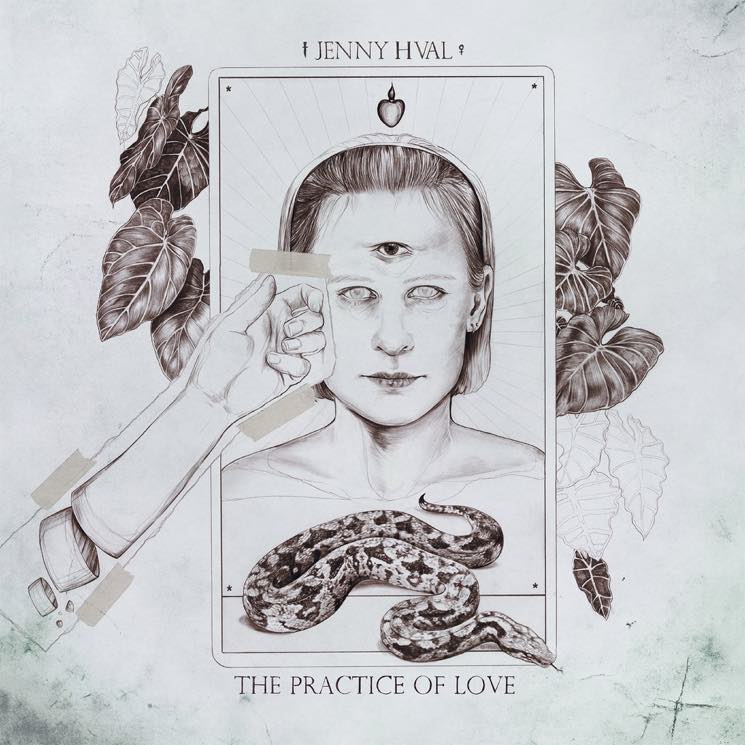Jenny Hval has never shied away from sparring with dogma. Unpacking it is her forte: over six albums, the Norwegian songwriter has rooted her albums in playful-yet-unflinching dissertations on subjects like sexuality, social constructs and '70s horror movie imagery.
Hval's seventh album, The Practice of Love, is no less ambitious, though its focus seems more intimate. Awash in blipping synth patterns and reflective observations, Love finds Hval sizing up the rigours of maintaining a sense of place as the years add up: with friends, with society, with art, with the self. That might sound less provocative at first pass, but it's no less compelling in its execution. Here, Hval finds vibrant clarity in eight songs of assessing one's status in the world at large.
"Lions" opens the album with a rumbling focus, as Hval takes stock of her surroundings: "Study the raindrops on the leaves / Study the ants on the ground." Shortly after, she arrives at a switch-up conclusion: "Where is god? This place doesn't know / This place doesn't care about the Holy scriptures." Elsewhere, the title track layers two separate conversations over drifting synths, as they touch on words within words and being childless in your late 30s.
As always, Hval writes her treatise to compelling soundscapes, and The Practice of Love contains some of her most accessible moments. "Ashes to Ashes" reflects on dreams, death and art while riding big-hook swells and programmed drums to a sense of triumphant joy. "Six Red Cannas" muses on art itself — "as if a song can communicate with the spirits or awaken the dead / I mean, isn't that what it is for?" — while using '90s trance beats to evoke an era that's long gone. The hypnotic drift of "Thumbsucker" lets proggy arpeggios and layered vocals (some from collaborator Felicia Atkinson) build until a point of clarity breaks its musical pattern: "Whatever it is you are doing to yourself / you are always performing some kind of internal construction work."
Wrapping The Practice of Love in avant-pop instrumentation, Hval nimbly threads complex sentiments through its prismatic shades of sound.
(Sacred Bones)Hval's seventh album, The Practice of Love, is no less ambitious, though its focus seems more intimate. Awash in blipping synth patterns and reflective observations, Love finds Hval sizing up the rigours of maintaining a sense of place as the years add up: with friends, with society, with art, with the self. That might sound less provocative at first pass, but it's no less compelling in its execution. Here, Hval finds vibrant clarity in eight songs of assessing one's status in the world at large.
"Lions" opens the album with a rumbling focus, as Hval takes stock of her surroundings: "Study the raindrops on the leaves / Study the ants on the ground." Shortly after, she arrives at a switch-up conclusion: "Where is god? This place doesn't know / This place doesn't care about the Holy scriptures." Elsewhere, the title track layers two separate conversations over drifting synths, as they touch on words within words and being childless in your late 30s.
As always, Hval writes her treatise to compelling soundscapes, and The Practice of Love contains some of her most accessible moments. "Ashes to Ashes" reflects on dreams, death and art while riding big-hook swells and programmed drums to a sense of triumphant joy. "Six Red Cannas" muses on art itself — "as if a song can communicate with the spirits or awaken the dead / I mean, isn't that what it is for?" — while using '90s trance beats to evoke an era that's long gone. The hypnotic drift of "Thumbsucker" lets proggy arpeggios and layered vocals (some from collaborator Felicia Atkinson) build until a point of clarity breaks its musical pattern: "Whatever it is you are doing to yourself / you are always performing some kind of internal construction work."
Wrapping The Practice of Love in avant-pop instrumentation, Hval nimbly threads complex sentiments through its prismatic shades of sound.
